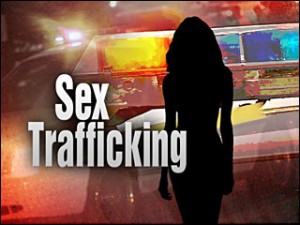 (The Root/New America Media)”He’d take wooden bats and hit me. I thought he loved me, but he’d turn around and beat me and all the girls in his house. But you just can’t get up and leave. He would threaten me about my family… I was afraid of getting hurt, so I just stayed.”
(The Root/New America Media)”He’d take wooden bats and hit me. I thought he loved me, but he’d turn around and beat me and all the girls in his house. But you just can’t get up and leave. He would threaten me about my family… I was afraid of getting hurt, so I just stayed.”
The speaker, who says she met her pimp when she was 11 years old, is seen in shadow to protect her identity. But you can tell that she’s black, and she sounds like she’s still young.
She’s not the only one who fits that description. In another segment of a YouTube video projected onto a screen in a packed Washington Convention Center ballroom at the Congressional Black Caucus Foundation’s Annual Legislative Conference session on Modern Slavery and Sexual Trafficking is “Erika.” She says she was 13 or 14 years old when she was lured into forced prostitution.
“I was shaped like a boy. Very stringy, very thin, very underdeveloped. It flabbergasts me that the people who were coming to buy us — the Johns, if you will — they knew I was a child. ”
When the screen goes dark, April Jones, the moderator of the two-hour “brain trust” conversation of experts on human trafficking, expresses what many in the room are no doubt thinking.
“The thing I noticed most about that video,” she says, “is that everyone spoke perfect English. Everyone was from this country. This is not something that happened hundreds of years ago. It’s happening here and now.”
“It,” of course, is slavery. From the point of view of panelist Ambassador Luis C.deBaca, director of the State Department’s Office to Monitor and Combat Trafficking in Persons, to call it anything else is a euphemism just as avoidant as previous ones in American history like “servitude” or “our peculiar institution.”
Today, he says, its victims are diverse. “It’s a woman lured from her home in another country with the promise of a good job. It’s the man recruited to work on a fishing boat, who, once land is out of sight, is forced to work 20 hours a day, who’s made to eat the bait, who’s raped by the ship’s operator.”
But in the United States, when it comes to sexual slavery, it’s often girls like Erika.
Panelist Malika Saadar Sar is a hero of the anti-trafficking community for her work with the Rebecca Project for Human Rights. She worked to shut down Craigslist ads that led to kids being sold for sex. “People sold for sex in this country are American children who are disproportionately black and brown,” she says. “They are between the ages of 12 and 13 — middle school aged. ”
Indeed, according to the most recent FBI report on the issue, 83 percent of victims of confirmed sex-trafficking cases were identified as U.S. citizens. Forty percent of the victims and 62 percent of the suspected perpetrators were black.
In some places, the demographic breakdown is even more dramatic, like in Houston. The jurisdiction of panel host Rep. Sheila Jackson-Lee is what she calls a “hub” of sexual slavery. According to panelist Ann Johnson, Harris County, Texas, prosecutor and human trafficking specialist, the breakdown of victims there is “roughly 55 African American, 25 Hispanic and 20 Caucasian.”
In individual cases, abuse and poverty at home may combine to make girls — often runaways — vulnerable to the men who see them as human capital, says Johnson. Just as often, says Saadar Sar, they’re victimized when they age out of the foster care system and the state no longer keeps track
In other words, as they’re held against their will, often subjected to torture, earning money for pimps through forced sex, no one is going to come looking for them.
There’s an even more insidious factor that compounds all of that. It’s one that makes the victims feel as though seeking help would be futile, according to C.deBaca. “It’s the notion that crime in the Hispanic community, in the black community, is not to be taken as seriously. Because that’s not where law enforcement officers go, that’s where the traffickers decide to go.”
Those issues, plus a long-standing commitment by the Congressional Black Caucus to be a voice on Capitol Hill for the vulnerable anywhere, are why Jackson-Lee says putting a stop to human trafficking is a natural part of the mission of the group of African-American elected officials.
“I want to be clear that many of modern-day slavery involves sex, and that it’s just as devastating as the slavery we’re more familiar with,” she told The Root.
On March 8, 2013, President Obama signed legislation that renewed the nation’s most important tool to fight modern-day slavery, the Trafficking Victims Protection Act.
Lee says it’s not enough.
“We need specific legislation — more local and state law enforcement to be alert to issues of human trafficking in states and local jurisdictions. We need more trained law enforcement so that we can prevent this,” she said.
For Saadar Sar the effort is a desperate one. “Many of these girls are the great-great-granddaughters of those who were enslaved during an earlier part of our history,” she says. “We must do the work of building underground railroads away from this new form of slavery.”








